动词转换成名词
汉语动词转换成英语名词的例句

汉语动词转换为英语名词例1:虎牌是一家制造高尔夫球杆和高尔夫设备的企业。
它拥有精密的设计、制造体系,可以在48小时内将量身定做的高尔夫球杆发货到美国2500家高尔夫用品专卖,并最终到达消费者手里。
译文:Tiger,a maker of golf clubs and golf accessories,has built a sophisticated design,manufacturing system that enables it to ship custom-made clubs ordered from one of 2,500 exclusive shops in the United States to its customers within 48 hours.分析:原文的“制造”为动词,翻译成英文的时候变为了名词maker,变动态为静态。
例2:英国东南部、荷兰和斯坎蒂纳维亚国家互联网新兴企业数量猛增。
爱尔兰已成为目前继美国之后的第二大软件出口国。
译文:There has been a surge in Internet start-ups in southeastern England,the Netherlands,and the Scandinavian countries;and Ireland is now the world’s number’two exporter of software(after the United States).分析:汉语动词“猛增”体现了句子的动态特征,英语用了名词surge来表达这个动词的含义,同时保留了英语的静态特征。
英语经常把动词能表达的信息用名词来表达,常常有名词连用、弱化动词的语法结构出现。
这样可以使英文表达精准,但会使语言缺乏动态感,增加语言的抽象性。
高中英语 动词如何转换成名词
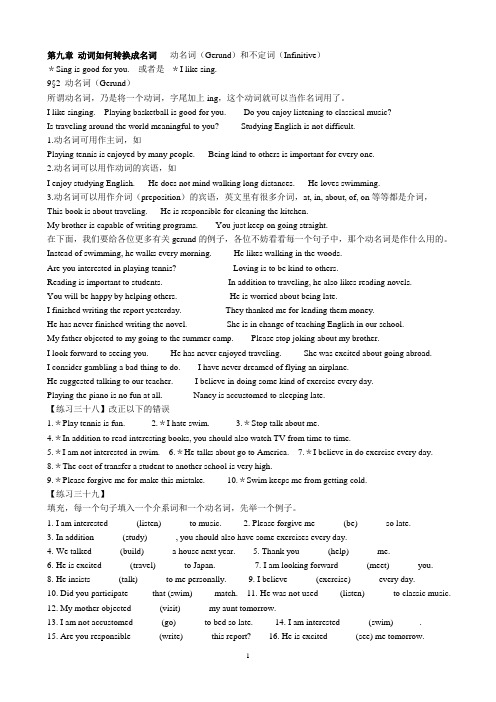
第九章动词如何转换成名词动名词(Gerund)和不定词(Infinitive)*Sing is good for you. 或者是*I like sing.9§2 动名词(Gerund)所谓动名词,乃是将一个动词,字尾加上ing,这个动词就可以当作名词用了。
I like singing. Playing basketball is good for you. Do you enjoy listening to classical music?Is traveling around the world meaningful to you? Studying English is not difficult.1.动名词可用作主词,如Playing tennis is enjoyed by many people. Being kind to others is important for every one.2.动名词可以用作动词的宾语,如I enjoy studying English. He does not mind walking long distances. He loves swimming.3.动名词可以用作介词(preposition)的宾语,英文里有很多介词,at, in, about, of, on等等都是介词,This book is about traveling. He is responsible for cleaning the kitchen.My brother is capable of writing programs. You just keep on going straight.在下面,我们要给各位更多有关gerund的例子,各位不妨看看每一个句子中,那个动名词是作什么用的。
Instead of swimming, he walks every morning. He likes walking in the woods.Are you interested in playing tennis? Loving is to be kind to others.Reading is important to students. In addition to traveling, he also likes reading novels.You will be happy by helping others. He is worried about being late.I finished writing the report yesterday. They thanked me for lending them money.He has never finished writing the novel. She is in change of teaching English in our school.My father objected to my going to the summer camp. Please stop joking about my brother.I look forward to seeing you. He has never enjoyed traveling. She was excited about going abroad.I consider gambling a bad thing to do. I have never dreamed of flying an airplane.He suggested talking to our teacher. I believe in doing some kind of exercise every day.Playing the piano is no fun at all. Nancy is accustomed to sleeping late.【练习三十八】改正以下的错误1.*Play tennis is fun.2.*I hate swim.3.*Stop talk about me.4.*In addition to read interesting books, you should also watch TV from time to time.5.*I am not interested in swim.6.*He talks about go to America.7.*I believe in do exercise every day.8.*The cost of transfer a student to another school is very high.9.*Please forgive me for make this mistake. 10.*Swim keeps me from getting cold.【练习三十九】填充,每一个句子填入一个介系词和一个动名词,先举一个例子。
动词转换成名词
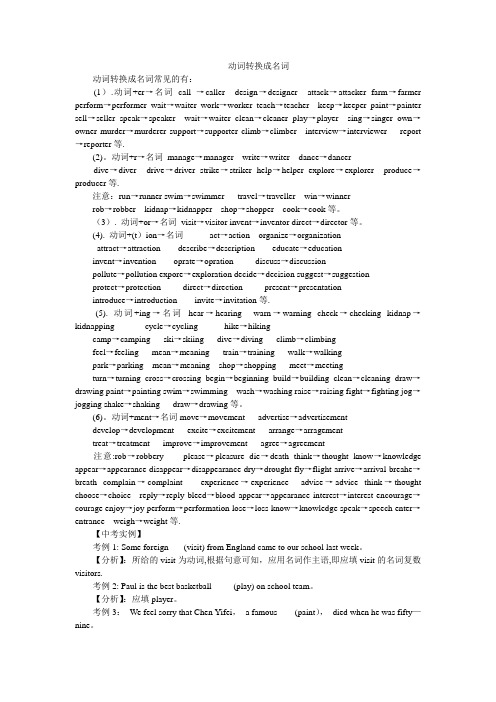
动词转换成名词动词转换成名词常见的有:(1).动词+er→名词call →caller design→designer attack→attacker farm→farmer perform→performer wait→waiter work→worker teach→teacher keep→keeper paint→painter sell→seller speak→speaker wait→waiter clean→cleaner play→player sing→singer own→owner murder→murderer support→supporter climb→climber interview→interviewer report →reporter等.(2)。
动词+r→名词manage→manager write→writer dance→dancerdive→diver drive→driver strike→striker help→helper explore→explorer produce→producer等.注意:run→runner swim→swimmer travel→traveller win→winnerrob→robber kidnap→kidnapper shop→shopper cook→cook等。
(3). 动词+or→名词visit→visitor invent→inventor direct→director等。
(4). 动词+(t)ion→名词act→action organize→organizationattract→attraction describe→description educate→educationinvent→invention oprate→opration discuss→discussionpollute→pollution expore→exploration decide→decision suggest→suggestionprotect→protection direct→direction present→presentationintroduce→introduction invite→invitation等.(5). 动词+ing→名词hear→hearing warn→warning check→checking kidnap→kidnapping cycle→cycling hike→hikingcamp→camping ski→skiing dive→diving climb→climbingfeel→feeling mean→meaning train→training walk→walkingpark→parking mean→meaning shop→shopping meet→meetingturn→turning cross→crossing begin→beginning build→building clean→cleaning draw→drawing paint→painting swim→swimming wash→washing raise→raising fight→fighting jog→jogging shake→shaking draw→drawing等。
英语词性转换归纳

动词变名词1.v+ ment 结尾achieve---achievement 成就advertise--- advertisement// advertisingagree— (in )agreementapartment 公寓amusement 娱乐argue---argument争吵commit奉献—commitmentcompliment 称赞,恭维develop---developmentdisgree—disagreementdepartment 局,部experiment 实验,试验equip 装备---equipment 装备,器材govern 统治—government 政府manage---management 经营管理2.V+ tion 结尾attract吸引—attraction 有吸引力的事或人;令人向往的地方conclude—conclusion 结论compete—competition 竞争,比赛discuss—discussion 讨论educate-----educationdecide----decisiondescribe—description描写,描绘express 表达----expression 词语;表达方式graduate 毕业—graduationoperate 操作,动手术—operationorganize----organization instruct—instruction 指导,介绍invent—inventor / invention invite—invitationinspire---inspiration 灵感,鼓舞人心的--- pollute----pollution 污染predict---prediction 预言pronounce ---pronunciationresolve 决心-----resolution 决心permit 允许-----permissionsuggest-建议,暗示--suggestionsolve解决-----solution 解决方法3.V+ ance 结尾appear—appearance 外貌,出现perform----performance 演出4.V+ ing 结尾bathe 洗澡---bathingend 结束----ending 结尾,结局train 训练---trainingmean ---- meaning 意义say-----saying 谚语5.V+ 其他Beg(乞讨)—beggar 乞丐behave 行为,举止----behaviorknow---knowledgefly—flight 飞行heat 加热---heat 热量hit 撞击------hit 轰动一时的人或物,碰撞mix 混合-----mixture 混合物press 按,压—pressure 压力sit-----seat 座位succeed-- successtour 在-----旅游,在-----作巡回演出直接+地点 tour China ---tour 旅游/ tourist 游客名词变形容词1.名词+yAnger 生气-----angryhunger---hungryfog—foggy有雾的fur----furry 毛皮的guilt 罪恶---guilty 内疚的health---healthyluck---luckycloud---cloudywind—windyrain---rainysnow---snowysun—sunnytourist------touristy 游客多的business---busysalt 盐--- salty 咸的shine---shiny 发亮的silk 丝绸—silky 丝绸般的sleep---sleepy 昏昏欲睡的taste 口味,品味------tasty 甜的2.名词+ edbalance –balanced 平衡的spot 斑点,地点----spotted 有斑点的talent-----talented 有天赋的organized 有组织的distusted 厌恶的offended 生气的crowded 拥挤的polluted 被污染的pleased 高兴的3.名词+ ful/less meaning—meaningful 有意义的care—careful/ careless 小心的;粗心的help---helpful / helpless home—homeless 无家可归的colour---colourfulpain 疼痛---painful 痛苦的use---useless/ usefulthank—thankful 充满感激的peace 和平 ---- peaceful 平静的,宁静的playful 顽皮的,爱玩耍的4.名词+ ableadjustable 可调整的comfort---comfortableknowledge---knowledgeablesuit 一套-----suitable 合适的5.名词+ ousenormous 巨大的danger—dangerousmystery 神秘-----mysterious 神秘的6.ce 变 tconfidence----confidentdifference---different7. al 结尾medicine 药----medical 医学的music---musicalnature---natural 自然的person---personal (私人的) nation—national 国家的education---educational有教育意义的tradition----traditional 传统的origin起源---original 新颖的;独创的8.名词+ lyfriend—friendlylive---lively 活跃的,有生气的love—lovely 可爱的9.+ en 结尾wood—wooden 木制的wool—woolen 羊毛的10. 其他energy精力---energeticfool 傻子—foolish 愚蠢的freedom 自由—free 空的,免费的height 高度—highillness 疾病--- ill love—loving 慈爱的death---deadpleasure---pleasant / pleased popularity 流行性—popular pride---proudscientist----scientific 科学的方位的词表达名词—形容词East—easternWest—westernSouth—southernNorth---northernIn the west of ChinaIn the western part of China四大洲名词-----形容词Asia 亚洲–---- AsianAfrica 非洲----- African Europe欧洲----- European America 美洲-----American形容词变副词1.形容词+ lybad—badlybright—brightly 明亮地casual—casually 随意地clear—clearly 清楚地complete—completely 完全correct---correctly 正确地final--finallyfortunate—fortunately幸运地general—generally 一般来讲loud—loudlyparticular 特殊的,独特的—particularly polite—politelyproper 合适的-,恰当的---properlymain------mainly 主要地most 多数-----mostly 多半,大多数normal---normally 正常地quick—quicklyquiet—quietly 轻轻地,安静地real—reallyrecent 最近的----recently 最近;近来hard 难的;努力地---hardly 几乎不late 迟的—lately 最近;近来sad--sadlyslow---slowlyspecial—specially 专门,特殊地specific---specifically 特定地,明确地strong—strongly 坚决地,强烈地sudden—suddenly突然usual—usually2. 以le 结尾的去e + ycomfortable---comfortablygentle—gentlypossible---possiblysimple ----simply 仅仅;只;简单地terrible---terribly3. 辅音字母+ y 变 ilyeasy—easilyheavy—heavilyhappy--happily4.特殊good—well好地 well 身体健康的,井true—truly名词---形容词—副词beauty 美,美人—beautiful—beautifully care—careful—carefully care—careless—carelesslydifference---different---differently happiness—happy—happily hunger—hungry--hungrily health—healthy—healthily luck—lucky—luckily noise—noisy—noisily pride—proud—proudly骄傲地sadness—sad—sadlysafety 安全;安全的地方—safe—safely silence—silent---silently 默默地success—successful—successfully truth—true—truly unluck—unlucky—unluckilywonder 奇迹—wonderful—wonderfully既是形容词又是副词early get up early ;an early trainlate be late for classcome late for schooldeep dive deep into the seaa hole deep largehigh jump high;a high mountainhard a hard question;a hard stone work hard / study hardrain hardlong It takes too longIt takes a long timefar jump farMy home is far from school straight a straight linego straight along here三 . 派生:指由一个词根加上前缀和(或)后缀构成另一个词的构词形式。
英语词汇 词性转换——动词变名词
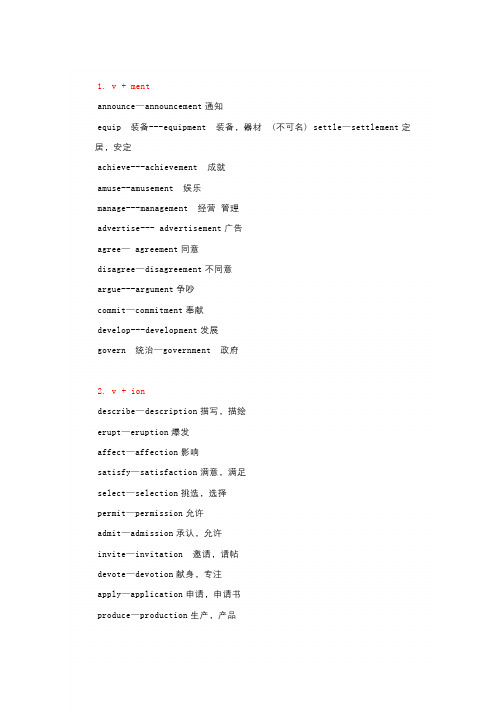
1. v + mentannounce—announcement通知equip 装备---equipment 装备,器材(不可名) settle—settlement定居,安定achieve---achievement 成就amuse--amusement 娱乐manage---management 经营管理advertise--- advertisement广告agree— agreement同意disagree—disagreement不同意argue---argument争吵commit—commitment奉献develop---development发展govern 统治—government 政府2. v + iondescribe—description描写,描绘erupt—eruption爆发affect—affection影响satisfy—satisfaction满意,满足select—selection挑选,选择permit—permission允许admit—admission承认,允许invite—invitation 邀请,请帖devote—devotion献身,专注apply—application申请,申请书produce—production生产,产品protect—protection保护educate-----education教育consider—consideration考虑attract—attraction 吸引力,吸引instruct—instruction 指导,介绍discuss—discussion 讨论appreciate—appreciation感激,欣赏recognize—recognition认出conclude—conclusion 结论decide----decision 决定compete—competition比赛express 表达— expression 词语;表达方式graduate 毕业—graduation operate—operation操作,动手术organize — organization 组织imagine—imagination 想象力introduce—introduction 介绍illustrate --illustration阐明,举例说明inspire---inspiration 灵感,鼓舞人心pollute----pollution 污染predict---prediction 预言pronounce ---pronunciation 发音resolve -----resolution 决心solve解决-----solution 解决方法impress —impression 印象suggest --suggestion 建议,暗示explain—explanation解释,说明3. v + anceenter—entrance进入,进口allow—allowance 允许appear—appearance 外貌,出现perform----performance 演出exist—existence 存在(特殊,记住)4. v + ingbathe 洗澡— bathingend — ending 结尾,结局,结束train — training训练mean — meaning 意义say — saying 谚语5. v + rynurse--nursery 婴儿室,幼儿园6. v + alpropose—proposal 建议withdraw—withdrawal 取钱;收回;撤退survive—survival 幸存arrive—arrival到达remove—removal撤离,搬离,去除7. v + iorbehave—behavior行为8. v + encytend—tendency趋势,倾向9. v + urepress—pressure压力mix—mixture混合,混合物10. v 变成人employ--employer 雇主,老板--employee雇员work—worker 工人visit—visitor访问者art—artist艺术家music—musician音乐家11.v的其他变化die—death死亡beg(乞讨)—beggar 乞丐sit--seat 座位fly—flight 飞行defend—defense防守,防卫weigh—weight重量,体重advise—advice建议practise—practice练习breathe—breath呼吸believe—belief 信仰know — knowledgeheat — heat热量hit 撞击— hit 轰动一时的人或物,碰撞receive—receptionist接待员serve—service服务succeed—success成功pursue—pursuit追求,从事analyze—analysis分析choose—choice选择。
高中英语---动词、形容词变名词词性转换规律

3.V+ ance 结尾 allow —— allowance 允许 appear —— appearance 外貌 ,出现 perform —— performance 演出 exist —— existence 存在
4.V+ ing 结尾 end —— ending 结尾,结局 train ——training训练 mean —— meaning 意义 say—— saying 谚语 remind —— reminding提醒 bathe ——bathing沐浴
6、V+ 其他 beg——beggar 乞丐 sit——seat 座位 believe —— belief 信仰 behave —— behavior 行为 know—— knowledge 知识 fly—— flight 飞行 mix —— mixture 混合物 press —— pressure 压力 serve —— service 服务 succeed ——success 成功 pursue —— pursuit 追求,从事 propose —— proposal 建议 withdraw —— withdrawal 取钱;收回;撤退 survive —— survival--survivor 幸存者 arrive —— arrival到达 analyze —— analysis 分析
高中英语---动词、形容词变名词 词性转换规律
1.v+ ment 结尾 achieve —— achievement 成就 advertise —— advertisement 广告 agree —— agreement 同意 amuse——amusement 娱乐 commit —— commitment 承诺,奉献 develop —— development 发展 disagree —— disagreement 不赞同 equip 装备 —— equipment 装备,器材 govern 统治 —— government 政府 manage——management 经营,管理 argue —— argument 争吵
英语单词词性转换

英语单词词性转换一、动词v.→名词n.1、词尾加上-er或-or之后就变成了表示"某一类人"的名词例如:work—worker, teach—teacher, sing—singer,jump—jumper, play—player, learn—learner,visit—visitor, invent—inventor,collect—collector等.注意:1以不发音的e结尾的动词,在词尾加-r.例如:drive—driver, write—writer等.2以辅音字母开头并以元音字母加辅音字母结尾的单词,应双写末尾的辅音字母再加er; 例如:run—runner, win—winner,begin—beginner等.2.在动词词尾加上-ment 变成名词例如:achieve—achievement 成就advertise—advertisement例如:argue—argument争论3.在动词词尾加上-tion/sion变成名词例如: attract—attraction; instruct—instruction;invent—invention discuss—discussion;express—expression educate—education;graduate—graduation; operate—operation 去e再加"ion"compete—competition; organize—organization 把e改成其他字母再加"tion"decide—decision conclude—conclusion 把de改为s再加"ion"describe—description描写,描绘这是特例,不规则变化4.在动词词尾加上-ance变成名词例如: appear—appearance 外貌;出现perform—performance 演出accept—acceptance 接受resist-resistance n.抵抗,阻力5.在动词词尾加-ing变成名词方法与动词变为现在分词的方法相同例如:meet—meeting build—building wait—waitingbathe—bathing say—saying谚语 mean—meaning注意:以辅音字母开头并以元音字母加辅音字母结尾的单词,应双写末尾的辅音字母再加-ing 如:swim—swimming shop—shopping begin—beginning二、动词v.→形容词adj.1.动词后面加able,以e结尾的动词则去e加able,表示具有此性质,特点或属性.例如: afford-affordable;love-lovable2.动词后面加ed,以e结尾的动词则直接加d,表示被动性的属性或特点.例如: scatter-scattered use-used3不规则的动词则必须记忆,记住其过去分词形式.规律不大,意义同b.三.名词n.→形容词adj.1.在名词后面加-y可以变成形容词尤其是一些与天气有关的名词例如: rain—rainy, cloud—cloudy, wind—windy, snow—snowy,health—healthy, luck—lucky,anger—angry guilt—guilty内疚的tourist—touristy游客多的 , salt 盐—salty 咸的silk丝绸—silky丝绸般的, sleep—sleepy 昏昏欲睡的注意:1如果以辅音字母开头并以元音字母加辅音字母结尾,这时应双写辅音字母再加"-y".如: sun—sunny, fun—funny, fog—foggy有雾的, fur—furry毛皮的2少数以不发音的e结尾的名词变为形容词时,应去掉e再加"-y".如: noise—noisy, ice—icy, shine—shiny发亮的, taste口味—tasty甜的2.名词后面加-ed,以e结尾的直接加d.例如: spot斑点—spotted有斑点的; talent—talented 有天赋的organize—organized 有组织的; balance—balanced平衡的3.一些抽象名词在词尾加-ful可以变为形容词例如:care—careful, thank—thankful, help—helpful,use—useful, meaning—meaningful4.在名词后加-less构成含有否定意义的形容词例如:care—careless粗心的, use—useless无用的hope—hopeless没希望的,home—homeless无家可归的5.一些以-ce结尾的名词,把-ce改为-t变成形容词例如: difference—different, silence—silent, confidence—confident 6.在名词后加-ly变为形容词例如: friend—friendly, love—lovely, live---lively7.在名词后加-ous变为形容词例如: danger—dangerous prosperous a 繁荣的pro 在前+sper 希望+ous 8.名词后面加-al变为形容词例如: music—musical; medicine—medical 这个比较特殊9名词后面加-able变为形容词,如果以e结尾就去e再加"-able".例如: adjust—adjustable 可调整的 value—valuable有价值的10.名词后面加-en变成形容词例如: wood—wooden 木制的 wool—woolen 羊毛的四.形容词adj.→副词adv.▲一般在形容词的词尾加-ly可以变成副词例如: quick—quickly, slow—slowly, loud—loudly, sudden—suddenly 等例如:possible—possibly, terrible—terribly。
英语单词词性转换
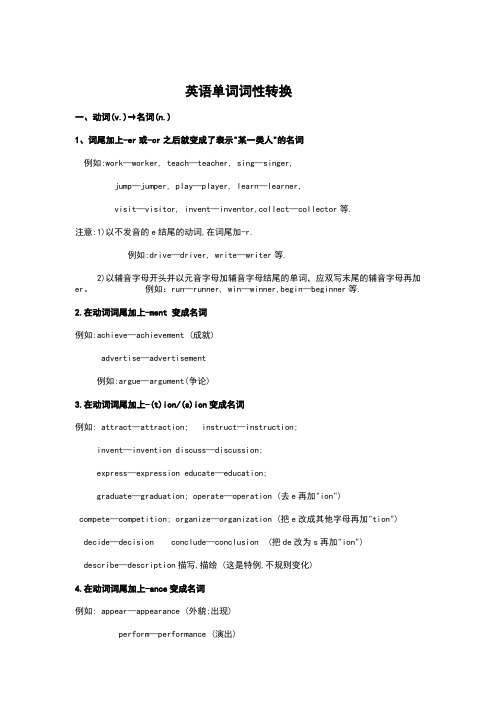
英语单词词性转换一、动词(v.)→名词(n.)1、词尾加上-er或-or之后就变成了表示"某一类人"的名词例如:work—worker, teach—teacher, sing—singer,jump—jumper, play—player, learn—learner,visit—visitor, invent—inventor,collect—collector等.注意:1)以不发音的e结尾的动词,在词尾加-r.例如:drive—driver, write—writer等.2)以辅音字母开头并以元音字母加辅音字母结尾的单词,应双写末尾的辅音字母再加er。
例如:run—runner, win—winner,begin—beginner等.2.在动词词尾加上-ment 变成名词例如:achieve—achievement (成就)advertise—advertisement例如:argue—argument(争论)3.在动词词尾加上-(t)ion/(s)ion变成名词例如: attract—attraction; instruct—instruction;invent—invention discuss—discussion;express—expression educate—education;graduate—graduation; operate—operation (去e再加"ion")compete—competition; organize—organization (把e改成其他字母再加"tion")decide—decision conclude—conclusion (把de改为s再加"ion")describe—description描写,描绘 (这是特例,不规则变化)4.在动词词尾加上-ance变成名词例如: appear—appearance (外貌;出现)perform—performance (演出)accept—acceptance (接受)resist-resistance n.抵抗,阻力5.在动词词尾加-ing变成名词 (方法与动词变为现在分词的方法相同)例如:meet—meeting build—building wait—waitingbathe—bathing say—saying(谚语) mean—meaning注意:以辅音字母开头并以元音字母加辅音字母结尾的单词,应双写末尾的辅音字母再加-ing如:swim—swimming shop—shopping begin—beginning二、动词(v.)→形容词(adj.)1.动词后面加able,以e结尾的动词则去e加able,表示具有此性质,特点或属性.例如: afford-affordable;love-lovable2.动词后面加ed,以e结尾的动词则直接加d,表示被动性的属性或特点.例如: scatter-scattered use-used3不规则的动词则必须记忆,记住其过去分词形式.规律不大,意义同(b).三.名词(n.)→形容词(adj.)1.在名词后面加-y可以变成形容词(尤其是一些与天气有关的名词)例如: rain—rainy, cloud—cloudy, wind—windy, snow—snowy,health—healthy, luck—lucky,anger—angry guilt—guilty(内疚的)tourist—touristy(游客多的) , salt (盐)—salty (咸的)silk(丝绸)—silky(丝绸般的), sleep—sleepy (昏昏欲睡的)注意:1)如果以辅音字母开头并以元音字母加辅音字母结尾,这时应双写辅音字母再加"-y".如: sun—sunny, fun—funny, fog—foggy(有雾的), fur—furry(毛皮的)2)少数以不发音的e结尾的名词变为形容词时,应去掉e再加"-y".如: noise—noisy, ice—icy, shine—shiny(发亮的), taste(口味)—tasty(甜的) 2.名词后面加-ed,以e结尾的直接加d.例如: spot(斑点)—spotted(有斑点的); talent—talented (有天赋的)organize—organized 有组织的; balance—balanced(平衡的)3.一些抽象名词在词尾加-ful可以变为形容词例如:care—careful, thank—thankful, help—helpful,use—useful, meaning—meaningful4.在名词后加-less构成含有否定意义的形容词例如:care—careless(粗心的), use—useless(无用的)hope—hopeless(没希望的),home—homeless(无家可归的)5.一些以-ce结尾的名词,把-ce改为-t变成形容词例如: difference—different, silence—silent, confidence—confident6.在名词后加-ly变为形容词例如: friend—friendly, love—lovely, live---lively7.在名词后加-ous变为形容词例如: danger—dangerous prosperous a 繁荣的(pro 在前+sper 希望+ous)8.名词后面加-al变为形容词例如: music—musical; medicine—medical (这个比较特殊)9名词后面加-able变为形容词,如果以e结尾就去e再加"-able".例如: adjust—adjustable 可调整的 value—valuable有价值的10.名词后面加-en变成形容词例如: wood—wooden 木制的 wool—woolen 羊毛的四.形容词(adj.)→副词(adv.)▲一般在形容词的词尾加-ly可以变成副词例如: quick—quickly, slow—slowly, loud—loudly, sudden—suddenly 等例如:possible—possibly, terrible—terribly。
动词变名词的六种情况

动词变名词的六种情况稿子一嘿,亲爱的小伙伴们!今天咱们来聊聊动词变名词的那些有趣事儿。
第一种情况呀,就是直接在动词后面加“er”或者“or”。
比如说“teach”这个动词,变成“teacher”,就是老师啦。
“act”变成“actor”,就成了演员。
是不是很神奇?还有呢,有些动词直接加“tion”“sion”“ment”。
像“invent”变成“invention”,“decide”变成“decision”,“develop”变成“development”,这样就有了新的名词哟。
再有哦,以“ing”结尾的动名词也能当名词用。
比如“swimming”“drawing”,是不是感觉很常见?另外呀,有的动词变名词是不规则的。
像“go”变成“gone”,“fly”变成“flight”,这可得特别记住。
还有一种,在动词后面加上“ance”“ence”。
比如“appear”变成“appearance”,“refer”变成“reference”。
最后哟,有些动词的名词形式就是它本身。
像“work”,既是动词也是名词。
怎么样,动词变名词是不是很有趣?多积累多练习,咱们就更厉害啦!稿子二亲人们,咱们来唠唠动词变名词的六种情况!先来说说加“er”“or”的,像“write”变成“writer”,作家就出来啦,“visit”变成“visitor”,访客就有啦。
然后呢,“tion”“sion”“ment”这一组也很重要。
“educate”变成“education”,教育就有了,“express”变成“expression”,表达就出现了。
还有哦,“ing”形式别小看,“shopping”“swimming”,这可都是名词。
接着说,“ance”“ence”也能变,“perform”变成“performance”,表演就有啦。
最后呀,有的动词本身就是名词,像“love”,爱这个动作,也是爱的意思。
所以呀,掌握这六种情况,咱们在英语学习中就能更厉害啦,加油加油!。
动词变名词转换规则

动词变名词转换规则
一、一般情况
1. 在动词词尾直接加 -er或 -or,变成表示“做某事的人”的名词。
- 例如:
- teach(教)→teacher(教师)
- work(工作)→worker(工人)
- visit(参观;访问)→visitor(参观者;访问者)
- 一般情况下,以 -e结尾的动词直接加 -r,如:write(写)→writer(作家)。
2. 在动词词尾加 -ion或 -tion或 -ation或 -sion等后缀,变成表示动作或状态的名词。
- 例如:
- act(行动)→action(行动)
- communicate(交流)→communication(交流)
- educate(教育)→education(教育)
- decide(决定)→decision(决定)
3. 一些动词在词尾加 -ing变成名词,表示与该动作相关的事物或活动。
- 例如:
- build(建造)→building(建筑物;大楼)
- paint(绘画)→painting(绘画;油画)
- meet(遇见;开会)→meeting(会议)
二、特殊情况
1. 有些动词需要改变词干中的元音字母,然后再加后缀变成名词。
- 例如:
- sing(唱歌)→singer(歌手),这里是把“i”变成“er”。
- drive(驾驶)→driver(司机),把“i”变成“er”。
2. 某些动词有不规则的名词形式。
- 例如:
- die(死亡)→death(死亡)
- know(知道)→knowledge(知识)。
高考3500动词变名词
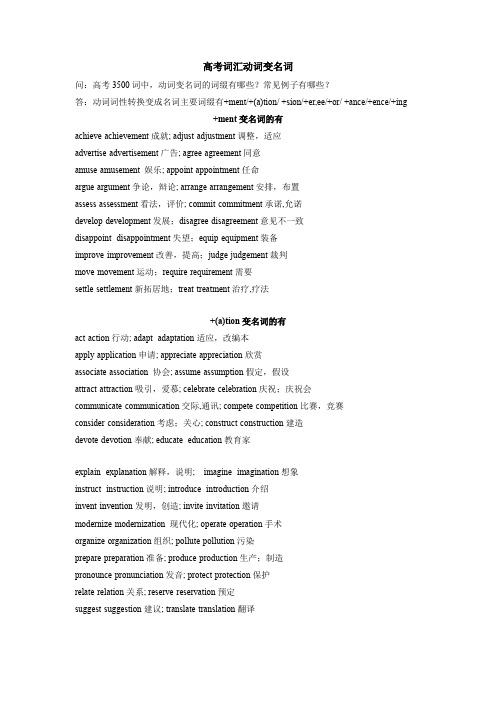
高考词汇动词变名词问:高考3500词中,动词变名词的词缀有哪些?常见例子有哪些?答:动词词性转换变成名词主要词缀有+ment/+(a)tion/ +sion/+er,ee/+or/ +ance/+ence/+ing+ment变名词的有achieve-achievement成就; adjust-adjustment调整,适应advertise-advertisement广告; agree-agreement同意amuse-amusement 娱乐; appoint-appointment任命argue-argument争论,辩论; arrange-arrangement安排,布置assess-assessment看法,评价; commit-commitment承诺,允诺develop-development发展;disagree-disagreement意见不一致disappoint- disappointment失望;equip-equipment装备improve-improvement改善,提高;judge-judgement裁判move-movement运动;require-requirement需要settle-settlement新拓居地;treat-treatment治疗,疗法+(a)tion变名词的有act-action行动; adapt- adaptation适应,改编本apply-application申请; appreciate-appreciation欣赏associate-association 协会; assume-assumption假定,假设attract-attraction吸引,爱慕; celebrate-celebration庆祝;庆祝会communicate-communication交际,通讯; compete-competition比赛,竞赛consider-consideration考虑;关心; construct-construction建造devote-devotion奉献; educate -education教育家explain- explanation解释,说明; imagine- imagination想象instruct- instruction说明; introduce- introduction介绍invent-invention发明,创造; invite-invitation邀请modernize-modernization 现代化; operate-operation手术organize-organization组织; pollute-pollution污染prepare-preparation准备; produce-production生产;制造pronounce-pronunciation发音; protect-protection保护relate-relation关系; reserve-reservation预定suggest-suggestion建议; translate-translation翻译+sion变名词的有admit-admission准入, 接纳; conclude -conclusion 结论;结束decide -decision决定; discuss - discussion讨论express - expression表达; impress -impression 印象possess -possession拥有+er/+or/+ee变名词的有work-worker工人;工作者; perform-performer表演者,执行者clean-cleaner清洁工,清洁器; compete-competitor竞赛者,比赛者educate -educator教育家; laugh-laughter笑; love-lover爱人organize-organizer组织者; paint-painter绘画者sail-sailor水手,海员; settle-settler移居者,开拓者train-trainer教练; train-trainee受训人员translate-translator翻译家; travel-traveler旅行者use-user使用者;用户; visit-visitor访问者,参观者wait-waiter男服务员/waitress女服务员employ雇佣-employer雇主/employee受雇佣的人+ance/+ence变名词的有assist-assistance帮助,援助,支持; differ-difference不同appear- appearance出现,露面;容貌; exist-existence存在compete-competence能力,胜任,管辖权; prefer- preference选择perform-performance 演出+ing变名词end-ending结束;build-building建筑;live-living生计;paint-painting油画;sail-sailing航海;suffer-suffering痛苦,苦难train-training培训+al变名词arrive-arrival到来,到达;refuse-refusal拒绝;survive-survival存活approve批准赞成-approval其它analyze- analysis分析;behave-behaviour行为,举止discover-discovery发现;die-death死equal-equality平等;fail-failure失败grow-growth生长;memorize-memory记忆please-pleasure高兴,愉快;press-pressure压迫produce-product产品;serve-service服务strengthen-strength力气;succeed-success成功type-typist打字员;weigh-weight重,重量。
初一英语词形转换方法总结

初一英语词形转换方法总结词形转换是指在英语中,一个单词的词形可以根据上下文或需要而发生变化。
下面是一些常见的初一英语词形转换方法总结:1. 动词转化为名词:如果一个动词变成名词,通常是为了更好地描述某个状态或概念。
例如,“run”可以转化为“running”,表示“奔跑”的状态。
2. 名词转化为动词:如果一个名词转化为动词,通常是为了更好地描述某个动作或行为。
例如,“book”可以转化为“booked”,表示“预订”某个地方或事物。
3. 形容词转化为动词:如果一个形容词转化为动词,通常是为了更好地描述某个状态或行为。
例如,“happy”可以转化为“happily”,表示“快乐地”做什么。
4. 副词转化为动词:如果一个副词转化为动词,通常是为了更好地描述某个动作或行为。
例如,“quickly”可以转化为“quicklyed”,表示“迅速地”做什么。
5. 介词转化为动词:如果一个介词转化为动词,通常是为了更好地描述某个动作或行为。
例如,“in”可以转化为“invaded”,表示“入侵”某个地方或事物。
初一英语词形转换方法总结:1. 动词转化为名词:观察动词后面的宾语,如果有名词,就将其转化为名词。
例如,“run”可以转化为“running”。
2. 名词转化为动词:观察名词后面的动词,如果有动词,就将其转化为名词。
例如,“book”可以转化为“booked”。
3. 形容词转化为动词:观察形容词后面的动词,如果有动词,就将其转化为形容词。
例如,“happy”可以转化为“happily”。
4. 副词转化为动词:观察副词后面的动词,如果有动词,就将其转化为动词。
例如,“quickly”可以转化为“quicklyed”。
5. 介词转化为动词:观察介词后面的动词,如果有动词,就将其转化为动词。
例如,“in”可以转化为“invaded”。
动词变动名词的方法

动词变动名词的方法
宝子,今天咱来唠唠动词变动名词的那些小方法,超有趣的哦!
一般来说呢,最常见的就是在动词后面直接加 -ing啦。
像“read(读)”,变成动名词就是“reading”。
就像给这个动词戴了个小帽子,一下子就变身啦。
这种方法超级简单,大多数动词都适用呢。
比如说“write(写)”,加上 -ing就成了“writing”,是不是感觉很神奇呀?
不过呢,有些动词稍微有点调皮,它们在加 -ing的时候会有一些小变化。
比如说以不发音的e结尾的动词,要先把e去掉,然后再加 -ing。
就像“make(做)”,变成动名词就是“making”,而不是“makeing”哦,可别弄错啦。
还有“take (拿)”,变成“taking”。
这就像是给这些动词做了个小手术,把多余的部分去掉,再戴上 -ing的小帽子,就完美变身啦。
还有一种情况呢,是重读闭音节结尾,末尾只有一个辅音字母的动词。
这种动词要双写这个辅音字母,然后再加 -ing。
比如说“run(跑)”,它的动名词就是“running”。
就好像这个动词要把自己的小尾巴紧紧抱住,再加上 -ing。
再比如“swim(游泳)”,变成“swimming”。
是不是很有趣呢?感觉这些动词就像在玩变身游戏一样。
宝子呀,动词变动名词其实也没有那么难啦,只要多记几个小规则,然后多练习练习,就能够轻松掌握啦。
你可以找一些动词来自己变一变,就像玩魔法一样,把一个个动词变成动名词。
下次再遇到动词变动名词的问题,你就可以轻松应对啦,加油哦! 。
英语中动词如何转换成名词

英语中动词如何转换成名词动词如何转换成名词动名词(Gerund)和不定词(Infinitive) 1. 动名词(Gerund)所谓动名词,乃是将一个动词,字尾加上ing,一夜之间,这个动词就可以当作名词用了。
请看以下的例子:I like singing.Playing basketball is good for you.Do you enjoy listening to classical music?Is traveling around the world meaningful to you? Studying English is not difficult. 1.动名词可用作主词,如Playing tennis is enjoyed by many people. Taking drugs is avoided by most people.Being kind to others is important for every one. Respecting your parents shows good character. 2.动名词可以用作动词的受词,如 I enjoy studying English.He does not mind walking long distances. I have never enjoyed being alone in my life. He loves swimming.3.动名词可以用作介系词(preposition)的受词,英文里有很多介系词,at, in, about, of, on等等都是介系词,介系词后面必定跟一个名词,也是它的受词,举例来说on the table in my home about Hitler of my lifeon this island各位一定注意到,每一个介系词后面都有一个名词,作为它的受词。
动名词是可以作为介系词的受词的,如:This book is about traveling.He is responsible for cleaning the kitchen. My brother is capable of writing programs. You just keep on going straight.在下面,我们要给各位更多有关gerund的例子,各位不妨看看每一个句子中,那个动名词是作什么用的。
动词谓语句变名词谓语句

动词谓语句变名词谓语句
将动词谓语句转换成名词谓语句可以通过名词化动词或者使用名词来替代动词。
以下是一些转换的示例:
1. 动词谓语句:他跑步锻炼身体。
名词谓语句:他进行跑步以锻炼身体。
2. 动词谓语句:她唱歌很动听。
名词谓语句:她的歌声很动听。
3. 动词谓语句:我喜欢读书。
名词谓语句:我对阅读感兴趣。
4. 动词谓语句:他写了一本小说。
名词谓语句:他创作了一本小说。
通过这样的转换,动词谓语表达的动作或行为变成了名词谓语表达的事物或状态。
这样的转换可以使句子更加具体、稳定,同时也可以减少动作的强调,更加突出事物的特性或状态。
词性转换练习题及答案
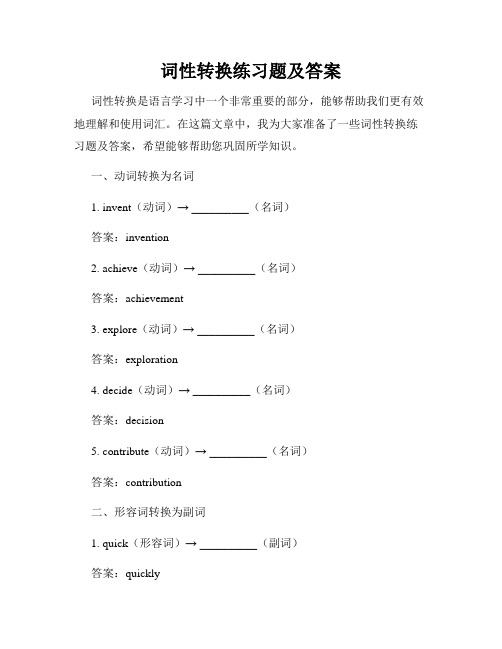
词性转换练习题及答案词性转换是语言学习中一个非常重要的部分,能够帮助我们更有效地理解和使用词汇。
在这篇文章中,我为大家准备了一些词性转换练习题及答案,希望能够帮助您巩固所学知识。
一、动词转换为名词1. invent(动词)→ __________(名词)答案:invention2. achieve(动词)→ __________(名词)答案:achievement3. explore(动词)→ __________(名词)答案:exploration4. decide(动词)→ __________(名词)答案:decision5. contribute(动词)→ __________(名词)答案:contribution二、形容词转换为副词1. quick(形容词)→ __________(副词)答案:quickly2. easy(形容词)→ __________(副词)答案:easily3. slow(形容词)→ __________(副词)答案:slowly4. careful(形容词)→ __________(副词)答案:carefully5. cheerful(形容词)→ __________(副词)答案:cheerfully三、名词转换为形容词1. success(名词)→ __________(形容词)答案:successful2. beauty(名词)→ __________(形容词)答案:beautiful3. health(名词)→ __________(形容词)答案:healthy4. power(名词)→ __________(形容词)答案:powerful5. happiness(名词)→ __________(形容词)答案:happy四、副词转换为动词1. simply(副词)→ __________(动词)答案:simplify2. slowly(副词)→ __________(动词)答案:slow3. quickly(副词)→ __________(动词)答案:quicken4. actively(副词)→ __________(动词)答案:activate5. clearly(副词)→ __________(动词)答案:clarify五、动词转换为副词1. dance(动词)→ __________(副词)答案:dancing2. sing(动词)→ __________(副词)答案:singing3. run(动词)→ __________(副词)答案:running4. swim(动词)→ __________(副词)答案:swimming5. play(动词)→ __________(副词)答案:playing通过词性转换的练习,我们能够更加灵活地运用词汇,增加我们的表达能力。
高考备考词汇复习词性转换之动词变名词常见规律及高频考词
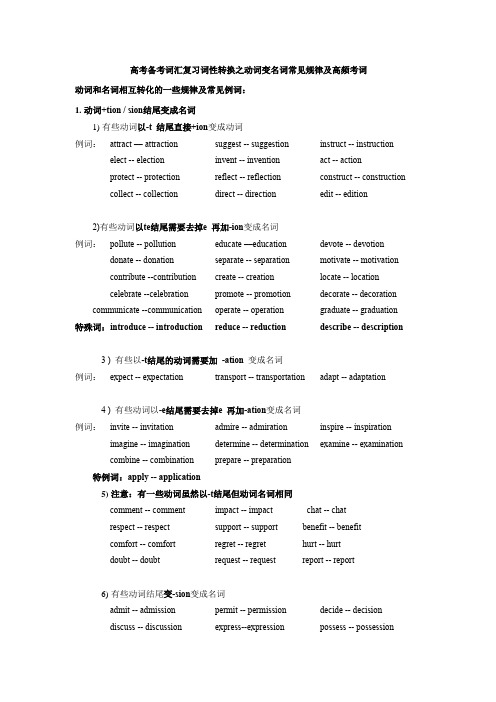
高考备考词汇复习词性转换之动词变名词常见规律及高频考词动词和名词相互转化的一些规律及常见例词:1.动词+tion / sion结尾变成名词1)有些动词以-t 结尾直接+ion变成动词例词:attract –– attraction suggest -- suggestion instruct -- instruction elect -- election invent -- invention act -- actionprotect -- protection reflect -- reflection construct -- constructioncollect -- collection direct -- direction edit -- edition2)有些动词以te结尾需要去掉e 再加-ion变成名词例词:pollute -- pollution educate ––education devote -- devotion donate -- donation separate -- separation motivate -- motivationcontribute --contribution create -- creation locate -- locationcelebrate --celebration promote -- promotion decorate -- decoration communicate --communication operate -- operation graduate -- graduation 特殊词:introduce -- introduction reduce -- reduction describe -- description3 ) 有些以-t结尾的动词需要加-ation 变成名词例词:expect -- expectation transport -- transportation adapt -- adaptation4 ) 有些动词以-e结尾需要去掉e 再加-ation变成名词例词:invite -- invitation admire -- admiration inspire -- inspiration imagine -- imagination determine -- determination examine -- examinationcombine -- combination prepare -- preparation特例词:apply -- application5)注意:有一些动词虽然以-t结尾但动词名词相同comment -- comment impact -- impact chat -- chatrespect -- respect support -- support benefit -- benefitcomfort -- comfort regret -- regret hurt -- hurtdoubt -- doubt request -- request report -- report6)有些动词结尾变-sion变成名词admit -- admission permit -- permission decide -- decisiondiscuss -- discussion express--expression possess -- possessionimpress-- impression conclude -conclusion2.动词+ ment 变成名词例词:achieve –– achievement develop –– development agree -- agreement advertise -- advertisement govern -- government amuse -- amusementmanage -- management excite -- excitement disappoint -- disappointmentappoint -- appointment treat -- treatment adjust -- adjustmentarrange -- arrangement invest -- investment argue -- argument3.动词+ance变成名词例词:allow -- allowance appear -- appearance disappear -- disappearance perform -- performance guide -- guidance rely -- reliance 特例词:exist -- existence refer – reference prefer – preference4.动词+ing变成名词例词:end -- ending train -- training mean -- meaningsay -- saying understand -- understanding greet -- greeting5.其他一些变化及不规则变化常见词appro ve -- appro val survive -- survival arrive -- arrivalbelie ve -- belie f relieve -- relief behave--behaviorserve -- service solve -- solution apologize -- apologycomplain -- complaint compete -- competition respond -- responseaffect -- effect fail -- failure succeed-- successmix -- mixture analyze -- analysis press -- pressuregrow -- growth discover -- discovery choose -- choice。
英语单词词性转换的基本规律
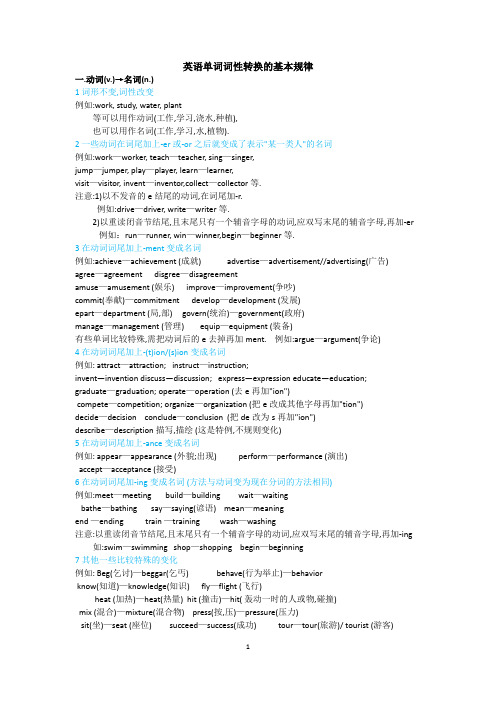
英语单词词性转换的基本规律一.动词(v.)→名词(n.)1词形不变,词性改变例如:work, study, water, plant等可以用作动词(工作,学习,浇水,种植),也可以用作名词(工作,学习,水,植物).2一些动词在词尾加上-er或-or之后就变成了表示"某一类人"的名词例如:work—worker, teach—teacher, sing—singer,jump—jumper, play—player, learn—learner,visit—visitor, invent—inventor,collect—collector等.注意:1)以不发音的e结尾的动词,在词尾加-r.例如:drive—driver, write—writer等.2)以重读闭音节结尾,且末尾只有一个辅音字母的动词,应双写末尾的辅音字母,再加-er例如:run—runner, win—winner,begin—beginner等.3在动词词尾加上-ment 变成名词例如:achieve—achievement (成就) advertise—advertisement//advertising(广告) agree—agreement disgree—disagreementamuse—amusement (娱乐) improve—improvement(争吵)commit(奉献)—commitment develop—development (发展)epart—department (局,部) govern(统治)—government(政府) manage—management (管理) equip—equipment (装备)有些单词比较特殊,需把动词后的e去掉再加ment. 例如:argue—argument(争论)4在动词词尾加上-(t)ion/(s)ion变成名词例如: attract—attraction; instruct—instruction;invent—invention discuss—discussion; express—expression educate—education; graduate—graduation; operate—operation (去e再加"ion")compete—competition; organize—organization (把e改成其他字母再加"tion") decide—decision conclude—conclusion (把de改为s再加"ion") describe—description描写,描绘 (这是特例,不规则变化)5在动词词尾加上-ance变成名词例如: appear—appearance (外貌;出现) perform—performance (演出)accept—acceptance (接受)6在动词词尾加-ing变成名词 (方法与动词变为现在分词的方法相同)例如:meet—meeting build—building wait—waitingbathe—bathing say—saying(谚语) mean—meaningend —ending train —training wash—washing注意:以重读闭音节结尾,且末尾只有一个辅音字母的动词,应双写末尾的辅音字母,再加-ing 如:swim—swimming shop—shopping begin—beginning7其他一些比较特殊的变化例如: Beg(乞讨)—beggar(乞丐) behave(行为举止)—behaviorknow(知道)—knowledge(知识) fly—flight (飞行)heat (加热)—heat(热量) hit (撞击)—hit( 轰动一时的人或物,碰撞)mix (混合)—mixture(混合物) press(按,压)—pressure(压力)sit(坐)—seat (座位) succeed—success(成功) tour—tour(旅游)/ tourist (游客)1动词后面加able,以e结尾的动词则去e加able,表示具有此性质,特点或属性.例如: afford-affordable;love-lovable2动词后面加ed,以e结尾的动词则直接加d,表示被动性的属性或特点.例如: scatter-scattered use-used2不规则的动词则必须记忆,记住其过去分词形式.规律不大,意义同(b).三.名词(n.)→形容词(adj.)1在名词后面加-y可以变成形容词(尤其是一些与天气有关的名词)例如: rain—rainy, cloud—cloudy, wind—windy, snow—snowy,health—healthy, luck—lucky,anger—angry guilt—guilty(内疚的)tourist—touristy(游客多的) , salt (盐)—salty (咸的)silk(丝绸)—silky(丝绸般的), sleep—sleepy (昏昏欲睡的)注意:1)如果以重读闭音节结尾,且词尾只有一个辅音字母,这时应双写辅音字母再加"-y".如: sun—sunny, fun—funny, fog—foggy(有雾的), fur—furry(毛皮的)2)少数以不发音的e结尾的名词变为形容词时,应去掉e再加"-y".如: noise—noisy, ice—icy, shine—shiny(发亮的), taste(口味)—tasty(甜的)2名词后面加-ed,以e结尾的直接加d.例如: spot(斑点)—spotted(有斑点的); talent—talented (有天赋的)organize—organized 有组织的; balance—balanced(平衡的)3一些抽象名词在词尾加-ful可以变为形容词例如:care—careful, thank1—thankful, help—helpful, use—useful, meaning—meaningful 4在名词后加-less构成含有否定意义的形容词例如:care—careless(粗心的), use—useless(无用的)hope—hopeless(没希望的),home—homeless(无家可归的)5一些以-ce结尾的名词,把-ce改为-t变成形容词例如: difference—different, silence—silent, confidence—confident6.在名词后加-ly变为形容词例如: friend—friendly, love—lovely, live---lively7.在名词后加-ous变为形容词例如: danger—dangerous8名词后面加-al变为形容词例如: music—musical; medicine—medical (这个比较特殊)9名词后面加-able变为形容词,如果以e结尾就去e再加"-able".例如: adjust—adjustable 可调整的 value—valuable有价值的10名词后面加-en变成形容词例如: wood—wooden 木制的 wool—woolen 羊毛的11一些表示国家的名词可以在词尾加-ese, -ish或-n构成表示国籍,语言的形容词例如:China—Chinese, Japan—Japanese, England—English,America—American, India—Indian, Australia —Australian(注意Canada—Canadian)▲一般在形容词的词尾加-ly可以变成副词例如: quick—quickly, slow—slowly, loud—loudly, sudden—suddenly 等但是,以下几点值得注意:1一些以"辅音字母+y"结尾的形容词,要把y改为i再加-ly例如: happy—happily, angry—angrily, lucky—luckily, heavy—heavily, noisy—noisily有些以-ble或-le结尾的形容词,去掉e加-y例如:possible—possibly, terrible—terribly3少数以e结尾的形容词,要去掉e再加-ly例如: true—truly但绝大多数以e结尾的形容词仍然直接加-ly例如: polite—politely, wide—widely4以-l结尾的形容词变为副词时要在词尾加-ly,以-ll结尾的才在词尾只加-y.例如: usual—usually, careful—carefully, useful—usefullyfull—fully (以-ll结尾的才只加y)PS:有些同学可能对元音辅音以及重读闭音节不是很了解,那我在这里再做下补充说明. 1.英语26个字母中,a e i o u是元音字母, y是半元音字母, 其余都是辅音字母.★所谓半元音就是有时候做元音,有时候做辅音.半元音字母y做元音有: shy,sky 做辅音比如最简单的:yes2.开音节和闭音节开音节分两种:绝对开音节和相对开音节绝对开音节指的是"元音字母结尾"的音节 (例如 we, hi等)相对开音节是指"辅音字母-元音字母-辅音字母-不发音的e"的音节,(r除外). ( 例如,take,make 等)比如:take (在这个单词中,t是辅音,a是元音,k是辅音,e是不发音的元音)◆在开音节中, 元音字母发他们在字母表中的音闭音节, 则是指"辅音字母-元音字母-辅音字母"的音节 ( -al等除外) (例如:leg,cross等)◆在闭音节中,元音字母发不同的音 a e i o u例 sat let sit not nut (试着读下这些单词,这些单词中,元音发的音都不是它们在字母表中发的音)2.英语重读闭音节就是以辅音因素结尾的,而且是重读音节的音节.比如apple 划音节就因该是ap/ple 前面那个ap是一个音节,这个音节以辅音因素p结尾,所以就是闭音节.(仅仅能看出是闭音节,是不是重读闭音节还要看这个音节是不是重读的) 重读闭音节三要素:1. 必须是重读音节;2. 最后只有一个辅音字母;3.元音字母发短元音 ( 说通俗点,打个比方, /u/是短元音,/u:/是长元音)重读闭音节即两个辅音中间夹一个元音.如:sit---sitting begin---beginning(重读在gin这个音节上)●像travel这个单词,"vel"也是"辅音+元音+辅音"的结构,但是重音不在vel这个音节上,所以不用双写"l",可以为travelled,也可以是traveled,更常用的是后者.。
- 1、下载文档前请自行甄别文档内容的完整性,平台不提供额外的编辑、内容补充、找答案等附加服务。
- 2、"仅部分预览"的文档,不可在线预览部分如存在完整性等问题,可反馈申请退款(可完整预览的文档不适用该条件!)。
- 3、如文档侵犯您的权益,请联系客服反馈,我们会尽快为您处理(人工客服工作时间:9:00-18:30)。
动词转换成名词
动词转换成名词常见的有:
(1) .动词 +er T 名词 call caller designdesigner attackattacker farm farmer perform T performer wait T waiter work T worker teach ^ teacher keep ^ keeper paint s pain ter sell t seller speak t speaker wait t waiter clean t cleaner play t player sing t singer own t owner murder t murderer support t supporter climb t climber interview t interviewer report t reporter 等。
(2) .动词 +r T 名词 manage r manager write T writer dance r dancer
dive t diver drive t driver strike t striker help t helper explore t explorer produce t producer 等。
注意: run t runner swim t swimmer travel t traveller win t winner
rob r robber kid nap T kid napper shop r shopper cook T cook 等。
(3) . 动词 +or T 名词 visit T visitor invent T inven tor direct T director 等。
(4) . 动词 +(t)ion T 名词
act T action organize r organization attract t attraction describe t description educate t education
invent t invention oprate t opration
discuss t discussion pollute t pollution expore t exploration decide t decision suggest t suggestion
protect t protection direct t direction present t presentation
introduce t introduction invite t invitation 等。
hearing warn t warning check t checking kidnap t hike t hiking dive t diving climb t climbing train t training walk t walking
shop t shopping meet t meeting
turn t turning cross t crossing begin t beginning build
t building clean t cleaning draw t drawing paint t painting swim t swimming wash t washing raise t raising fight t fighting jog t
jogging shake t shaking draw t drawing 等。
(6).动词 +ment r 名词 move r movement
advertise T advertisement develop t development excite t excitement arrange t arragement
treat t treatment improve t improvement agree t agreement
注意: rob t robbery please t pleasure die t death think t thought know t knowledge appear t appearance disappear t disappearance dry t drought fly t flight arrive t arrival breahe t breath complain t complaint experience t experience advise t advice think t thought choose t choice reply t reply bleed t blood appear t appearance interest t interest encourage t courage enjoy t joy perform t performation lose t loss know t knowledge speak t speech enter t entrance weigh t weight 等。
【中考实例】
考例 1 : Some foreign ___(visit) from England came to our school last week.
【分析】:所给的 visit 为动词,根据句意可知,应用名词作主语,即应填 visit 的名词复 数 visitors. 考例 2: Paul is the best basketball ___ (play) on school team.
【分析】:应填 player 。
考例 3: We feel sorry that Chen Yifei, a famous ___ (paint), died when he was fifty-nine.
【分析】:应填 painter 。
考例 4: Every child has a dream. My life dream is to be a pop ___ (sing).
【分析】: (略 )应填 singer 。
(5). 动 词 +ing t 名 词 hear t
kidnapping
cycle t cycling camp t camping ski t skiing feel t feeling mean t meaning park t parking mean t meaning。
